Public Opinion on Coronavirus Around the World
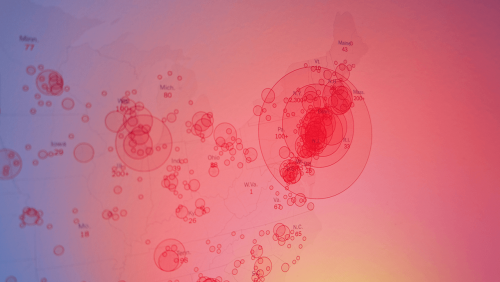
As the coronavirus pandemic begins to quickly spread across the globe, Council experts assess public opinion around about the virus and its impact.
United States
In the US, the number of confirmed cases has surpassed 1,000, the quickening spread of the coronavirus has dominated news headlines in recent weeks and raised concerns about public health and freefalling markets. As the stock market has surpassed correction territory and now flirts with bear market status, Americans are increasingly worried about the long-term economic implications of the virus.
According to recent YouGov surveys, majorities of Americans (56%) believe the recent drop in stock prices will have somewhat of an impact (35%) or a strong impact (21%) on the US economy in the long term. In fact, when breaking the data down by demographic, all subgroups agree, with the lone exception being Republicans (48%).
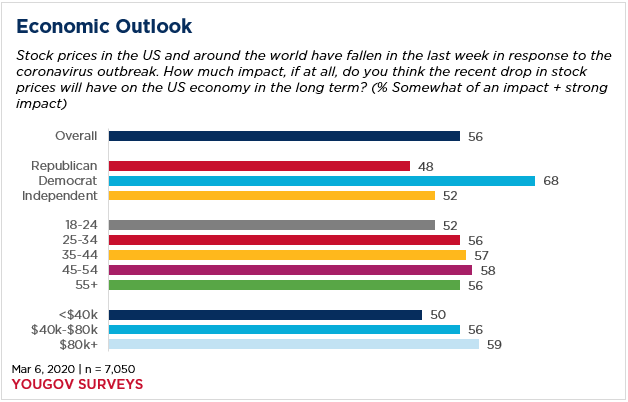
The market’s sharp downturn has been fueled by speculation of significant change in consumer behaviors in response to the outbreak. Thus far in America, however, few individuals report changing their behaviors. Just 14 percent have changed travel plans, 11 percent have begun working from home, and 9 percent have begun wearing a medical face mask in public. It should be expected, however, that these numbers will increase as the reported cases in the US inevitably spike.
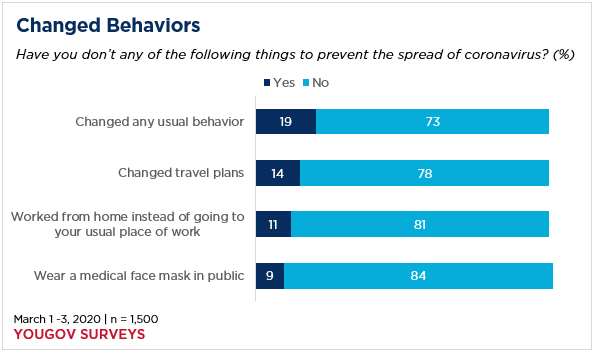
In the same survey, a higher percentage of Americans say they think authorities should enact new measures to help slow or contain the spread of disease. A third say that authorities should require people who can work from home to do so (36%) and cancel long distance travel (31%). Meanwhile, a quarter (25%) of Americans say that all large meetings or gatherings should be canceled. Not to mention, a strong majority (69%) say that quarantines should be enacted for individuals who have traveled in area severely impacted by coronavirus.
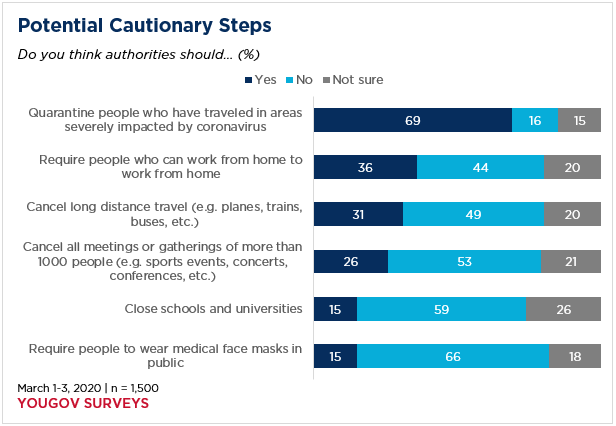
As the federal government struggles with consistent and transparent messaging and test production, belief among the public appears to only further reflect the partisan divide: according to a Reuters/Ipsos poll, Democrats are about twice as likely as Republicans to say the coronavirus poses an imminent threat to the United States.
Increasing Global Concern
As the coronavirus continues to spread, there is rising concern about the virus’ impact around the world. In their most recent February 28-29 international survey, Ipsos found significant increases in individuals’ perception of the personal and national threat posed by the virus. One-third of Italians (34%) say the virus is a very high or high threat to Italy, up from 26 percent in mid-February. In France, the country with the largest increase in national threat perception, the percentage of those who say coronavirus poses a very high or high threat to the country has more than doubled in just two weeks (49%, up from 20%). While individuals have seen the virus as a threat to global public health for some time, these increases suggest that individuals now see the virus as a more immediate threat to themselves, their families, and their countries.
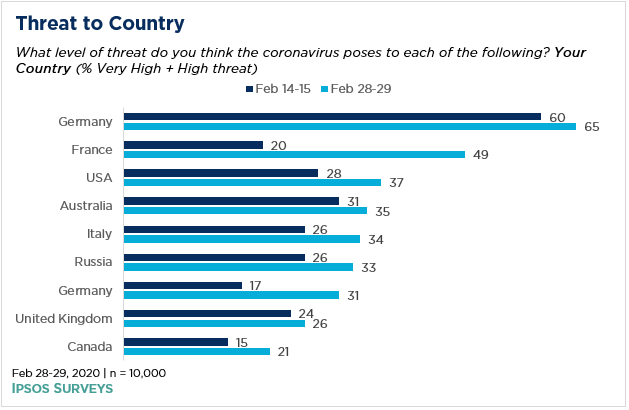
Along with this rise in perceived national risk, perception of the financial impact of the coronavirus has increased in all countries surveyed. In Italy, where the number of cases has surpassed 10,000, 41 percent of those surveyed agreed or somewhat agreed with the statement “The coronavirus will have a financial impact on me and my family,” a 22 point increase from the 19 percent of Italians who said the same in polling conducted February 14-15. Perception of the financial threat posed by the coronavirus has also increased in the US: 37 percent of Americans say the virus will have a financial impact on themselves and their families, up from 21 percent in mid-February.
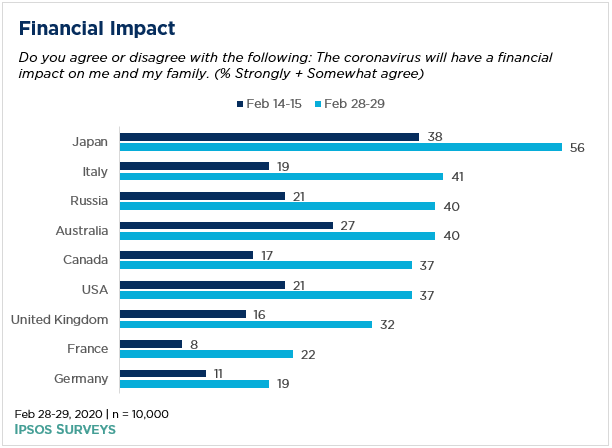
Japan
The Japanese cabinet has approved a bill that would allow Prime Minister Abe to declare a state of emergency. The legislation would allow prefectural governments more leeway in closing schools, using private facilities to provide medical care, and controlling supplies of medicine and food. This move follows the adoption of new emergency relief measures for businesses and workers affected by the spread of the novel coronavirus COVID-19.
These increased measures are in part a response to the concerns of the Japanese public, which has been worried about the spread of the COVID-19 for weeks. The latest NHK poll, conducted March 3-6, found three in four Japanese (74%) worried for themselves or their family potentially contracting COVID-19, with one in four (24%) saying they were very worried. And nearly all Japanese are worried about the effects of the virus’ spread on Japan’s economy (60% very worried, 30% somewhat).
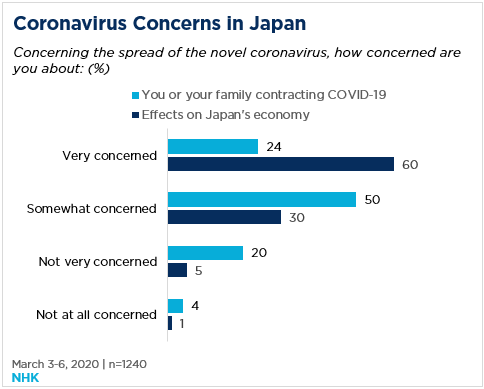
South Korea
Before cases dramatically increased in Italy and Iran, South Korea had the second largest number of cases outside of China. The southern city of Daegu was put on quarantine, and the government began an extensive testing campaign. It even rolled out drive-thru tests. These tests were free of charge and led South Korea to build the most comprehensive dataset on the coronavirus now available.
The public remains concerned, with 74 percent saying they are worried about contracting the virus in a poll conducted March 3-5 by Gallup Korea. A smaller majority (52%) think it is likely they will contract the virus.
In terms of the economy, 46 percent report damage to their incomes over the past month. That number was 90 percent among those who report working at small businesses. One-half of all respondents (51%) report there was no change.
Despite the onset of the virus in South Korea, approval rates for President Moon Jae-in remain stable with 44 percent approval versus 48 percent disapproval. This is largely unchanged over the past year. Views of the president divide starkly along partisan lines. While 89 percent of his party approves of his job performance 92 percent of the opposition disapproves. Thus, his approval rates are unlikely to deteriorate—barring a breakout in Seoul or other unforeseen event—ahead of the April 15 National Assembly elections.
For the latest information on the COVID-19 coronavirus, check with the US Centers for Disease Control and Prevention





